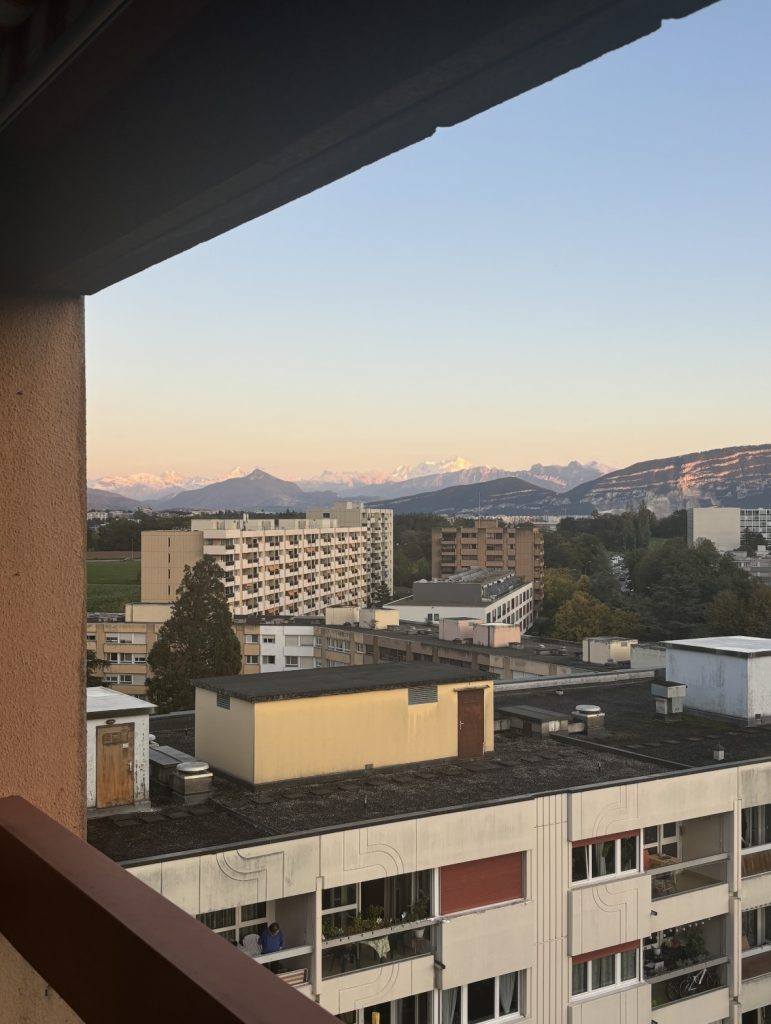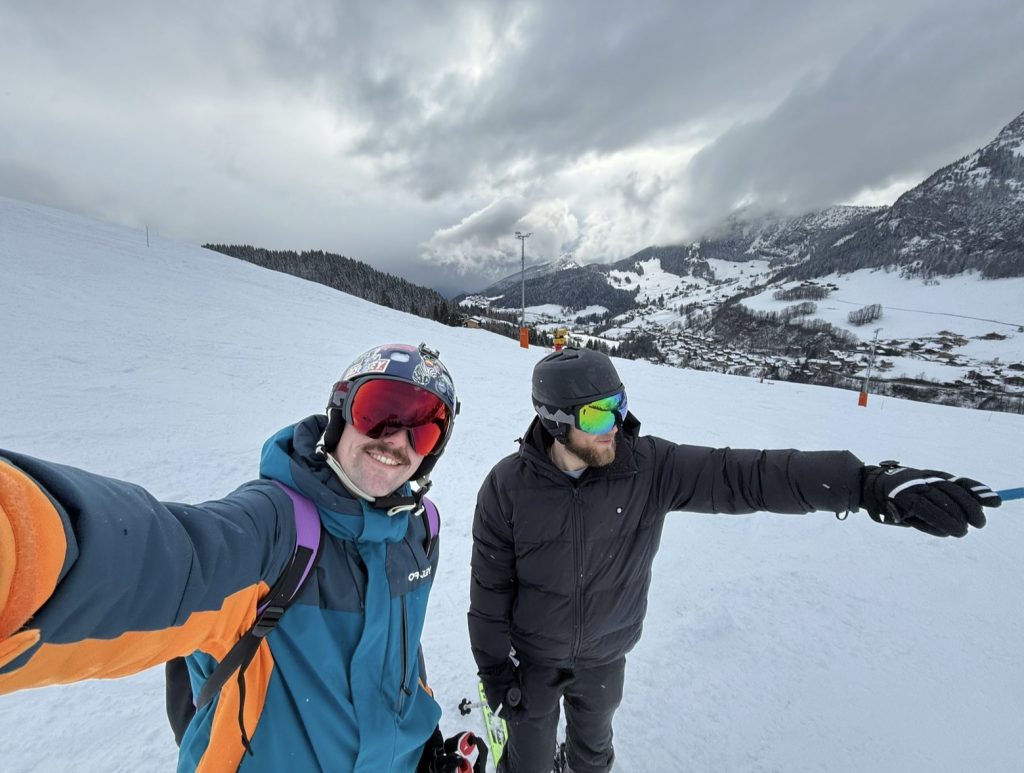My name is Andries and I am a fourth year particle physics student. I have just completed my year abroad in Geneva, Switzerland, working at the LHCb experiment at CERN. CERN is home to the Large Hadron Collider, a circular particle accelerator with a circumference of 27km, making it the largest in the world. The LHCb is one of the four detector-based experiments around the ring and is a dedicated study of heavy flavour physics. If you’d like to read more about the LHCb experiment and what I did, you can find my master’s thesis in the CERN document server: https://repository.cern/records/qd2b6-yvt35
The great thing about working at CERN on my master’s project was the flexibility in my working hours, provided I was consistently making progress between each meeting with my supervisor. These meetings were typically twice a week, once I had gotten past the initial learning curve. A typical day would start with getting ready and having breakfast, which I had the luxury of enjoying over a view of the Geneva city skyline and the nearby mountains. The view from our 11th floor flat was fantastic, and when the sky was clear enough we could even see Mont Blanc towering over the rest of the Alps. Then I would do my morning walk to CERN which took around 30 minutes and cut through the nearby fields and sports grounds, unless it was raining in which case I would take the bus. At the start of the year I was apprehensive about regularly using the TPG transport service in Geneva as a single fare cost 3.00 CHF (approximately £2.70). However, this changed in January of this year when the Swiss government issued a free TPG travel pass to all students under 25 living in the canton of Geneva. After some brief paperwork, I was free to use the transport service to my heart’s content, and I ended up taking the bus far more often than just when it rained.

During my 8-month stay I never got bored of the arrival into CERN on my commute. The first discovery of the Higgs boson in 2012 launched CERN into worldwide recognition, even amongst people outside the academic community due to pop culture references such as the LHC’s appearance in the film Angels & Demons. This has led to a steady increase in the volume of tourists and visitors stopping at CERN out of curiosity and interest in particle physics and its relevance in modern science. To accommodate this steady increase, various attractions were built which provide a vibrant and modern aesthetic to the entrance of CERN, including the Science Gateway, the Globe of Science and Innovation and the array of national flags for all 25 of CERN’s member states. A short walk through the entrance turnstiles took me to my office which I shared with one of my flatmates and a researcher from Rutherford Appleton Laboratory. I always opted to work in the office as it was peaceful and I had a nice set up across 2 computers and 3 monitors, even in the later weeks of my placement where my focus was thesis-writing which I could just as well have done from home.
I would go for lunch with my flatmates around 1 or 1.30 since the main restaurant would usually be far too busy between 12 and 1 to find a seat. We usually brought food from home to heat up in the microwave and eat, although sometimes we’d treat ourselves to a tasty meal from the canteen, or a coffee and dessert afterwards. Towards the late spring the weather became very consistently warm and sunny and so we would often sit outside with an ice cream after lunch, so comfortably that we’d have to drag ourselves with great effort back to the office to carry on with work.
I’d typically work until around 6 before heading home, where I would occasionally do some more work from my bedroom desk before dinner. Since food was quite expensive, dinner would usually be made from very simple ingredients, although incorporating things like seasonings, cream or wine in the cooking would ensure my meals never tasted too boring. My flatmates were all competent cooks, and so our apartment would always smell of an intriguing mixture of everyone’s unique culinary styles and influences in the evening, and we’d often share ideas and tips to influence each other’s cooking. My evening activities would differ on each day of the week, as there were often very fun things to do near CERN or closer to the city center. For example, on Tuesday evenings a venue named AMG in the city centre would host a jazz open mic night, where musicians would go to jam and improvise over classic jazz standards, as well as drink and network with others. Although I never had the confidence to go up and join in, I loved going to listen to the music and soak up the warm and rustic atmosphere of the bar.
My Saturdays would start with a morning trip to the supermarket E.Leclerc on the French side of the border, right next to the LHCb experiment control room. While the average price of a week’s food shopping was more expensive than in the UK, I found that there was a huge price difference between some oddly specific items. For example drinks, bread and dry pasta were much cheaper than in an average Tesco or Asda, while onions and garlic could be as much as three times the price as in the UK. After the food shop and a quick lunch, the rest of Saturday was often spent exploring the Geneva city center, usually around my favourite spots such as the Old Town where the cathedral and city hall can be found, the botanical gardens right next to the United Nations and the World Trade Organisation, and Plainpalais where a lot of the bars and restaurants are situated. One of my favourite places to go was a pub on Plainpalais called L’éléphant dans la canette (the elephant in the can) because of its affordable prices and charming ambience. Another favourite was a coffee shop near the station called Oh Martine whose biscoff and caramel cheesecake was a go-to order for me.
Ice hockey is one of Switzerland’s three national sports and boasts a competitive scene in Geneva, with leagues for all ages. Within a 5-minute walk of our apartment was the Meyrin Ice Hockey club, whose outdoor rink was open to the public throughout various periods during the week. Since the entry fee was only 3 CHF, learning to ice skate became one of my hobbies, in particular on Sunday evenings as the rink was open until 8pm and would always be very quiet towards the end of the session. In the dozen or so times I went, I progressed from hardly being able to stand upright to attempting some tricks on the ice such as forward crossovers and various stops.

Outside my regular routine, I tried new and exciting experiences such as exploring the nearby mountains on challenging hikes and skiing in Le Grand-Bornand. My time abroad taught me the importance of maximising my experiences during my travels, as time flew by faster on my year abroad than in any other year of study. Thank you for reading 🙂
